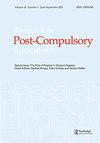Academic staff governors’ power and professional status in the governance of further education colleges in England
IF 0.9
Q3 EDUCATION & EDUCATIONAL RESEARCH
引用次数: 0
Abstract
ABSTRACT At a time of the British government’s heightened interest in Further Education (FE) college governance, this paper explores Academic Staff Governor (ASG)’s professional and power status at three colleges in England. The study draws upon relevant literature to identify concepts related to ASGs’ power and professional status in governance. An interpretivist stance is used to collect predominantly qualitative data through a combined methods approach. During fieldwork, evidence from semi-structured interviews; questionnaire responses, observations of governance meetings and governance documents was analysed. Findings suggest that ASGs’ insiderness; relationships, professional status and the decision-making circumstances may limit their influence in the governance of the colleges, with implications for governance quality. From the exploration, ‘The Restricted Professional Model’ has been developed to highlight the restricted nature of the ASG role with implications for good governance. For governors, organisations and policymakers, the research recommends avoiding low-power and low-status governance roles; taking action to develop ASGs’ professionality as educators; removing structural and power barriers and allowing more opportunities for ASGs to contribute to governance. Finally, future research is identified including research to establish ASGs’ professional profiles in FE and the wider impact educators’ professionality has on governance in a variety of educational institutions.英国继续教育学院管理中学术人员管理者的权力和职业地位
摘要在英国政府对继续教育(FE)学院治理的兴趣日益高涨之际,本文探讨了英国三所学院的教务长(ASG)的职业和权力地位。该研究利用相关文献来确定与ASG在治理中的权力和专业地位相关的概念。解释主义立场主要用于通过组合方法收集定性数据。在实地调查期间,来自半结构化访谈的证据;对调查表答复、治理会议的意见和治理文件进行了分析。研究结果表明,ASG的内在性;关系、职业地位和决策环境可能会限制它们在大学治理中的影响力,并影响治理质量。在探索过程中,制定了“受限专业模式”,以突出ASG角色的受限性质,并对善治产生影响。对于州长、组织和政策制定者,研究建议避免扮演低权力和低地位的治理角色;采取行动发展助理秘书长作为教育工作者的专业能力;消除结构性和权力障碍,让ASG有更多机会为治理做出贡献。最后,确定了未来的研究,包括建立ASG在FE的专业档案的研究,以及教育工作者的专业性对各种教育机构治理的更广泛影响。
本文章由计算机程序翻译,如有差异,请以英文原文为准。
求助全文
约1分钟内获得全文
求助全文
来源期刊

Research in Post-Compulsory Education
EDUCATION & EDUCATIONAL RESEARCH-
CiteScore
1.30
自引率
14.30%
发文量
31
期刊介绍:
Throughout the world, there is a growing awareness of the significance of vocational and post-compulsory education and training systems. The majority of countries are working hard to develop their provision, recognising the importance of post-compulsory education in providing educated and skilled people in sufficient numbers at appropriate levels to assist economic and social development. Research in Post-Compulsory Education, sponsored by the United Kingdom"s Further Education Research Association (FERA), recognises the need for more international research and analysis and the generation of relevant theory in order to identify policy needs and trends as well as priorities in this growing area.
 求助内容:
求助内容: 应助结果提醒方式:
应助结果提醒方式:


